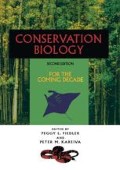Abstract
The amount of land that is abandoned or severely degraded is large and increasing, with especially profound implicatons for conservation in the tropics. In particular, approximately one-half of the area of tropical forest lost each year expands the base of productive agriculture, whereas the other half simply replaces agricultural land that is worn out and abandoned (Houghton 1994). Consequently, if tropical agriculture were sustainable, the “...total agricultural area could continue to grow at current rates while, at the same time, rates of deforestation could be reduced by approximately 50%” (Houghton 1994, p. 311). Clearly, for the tropics at least, sustainable agriculture is a necessary precondition for the conservation of biodiversity (see also Hoffman and Carroll 1995).
Access this chapter
Tax calculation will be finalised at checkout
Purchases are for personal use only
Preview
Unable to display preview. Download preview PDF.
Literature Cited
Bellows, B. 1992. Sustainability of steep land bean (Phaseolus vulgaris L.) farming in Costa Rica: an agronomic and socio-economic assessment. Ph.D. Dissertation, University of Florida, Gainesville.
Bentley, J.W. and K.L. Andrews 1991. Pests, peasants and publications: anthropological and entomological views of an integrated pest management program for small-scale Honduran farmers. Human Organization 50:113–123.
Bojo, J.P. 1991. Economics and land degradation. Ambio 10:75–79.
Bunch, R. 1994. The potential of slash/mulch for relieving poverty and environmental degradation. In Slash/Mulch: How Farmers Use It and What Researchers Know About It, eds. H.D. Thurston, M. Smith, G. Abawi, and S. Kearl. Ithaca, NY: Cornell International Institute for Food, Agriculture and Development, Cornell University.
Carriere, J. 1991. The crisis in Costa Rica: An ecological perspective. In Environment and Development in Latin America: The politics of sustainability, eds. D. Goodman and M. Redclift. New York: Manchester University Press.
Carroll, C.R., J.H. Vandermeer, and P.M. Rossett, eds. 1990. Agroecology. New York: McGraw-Hill.
den Biggelaar, C. 1991. Farming Systems Development: Synthesizing Indigenous and Scientific Knowledge Systems. Agriculture and Human Values 8:25–36.
Dix, A.M. 1995. IPM in non-traditional export agriculture in Guatemala: the case of Chilasco, Baja Verapaz, Guatemala. XIX International Congress, Latin American Studies Association, Washington D.C., September 28–30 1995 (proceedings in press).
Dix, A.M. and C.R. Carroll. 1995. IPM in non-traditional export agriculture in Guatemala: the case of Chilasco, Baja Verapaz, Guatemala. IPM CRSP Working Paper 95–4, IPM CRSP, Office of International Research and Development, Virginia Tech University, Blacksburg, VA 24061–0334.
Dix, A.M., C.R. Carroll, M.W. Dix, and G. Dal Bosco. 1995. Corn stalks influence patchy distribution of white grubs in broccoli fields. IPM CRSP Working Paper 95–5, IPM CRSP, Office of International Research and Development, Virginia Tech University, Blacksburg, VA 24061–0334.
Duncan, C. 1991. Agriculture, export diversification, and the environment in Central America. In Modernization and stagnation: Latin American agriculture into the 1990’s, eds. M.J. Twomey and A. Helwedge. New York: Greenwood Press.,
Fujisaka, S. 1992. Farmer knowledge and sustainability in rice-farming systems: Blending science and indigenous innovation. In Diversity, Farmer Knowledge, and Sustainability, eds. J.L. Moock and R.E. Rhoades. Ithaca: Cornell University Press.
Garst, R. and R. Barry. 1990. Feeding the crisis: U.S. food aid and farm policy in Central America. Lincoln: University of Nebraska Press.
GEXPRONT 1994. Bases para la elaboracion de una politica de desarrollo economico atraves de las exportaciones. Guatemala, Mayo de 1994 (Authors’ note: GEXPRONT is the growers association that promotes non-traditional export crops and offers technical help on production practices.)
Hoffman, C.A. and C.R. Carroll. 1995. Can we sustain the biological basis of agriculture? Annual Review of Ecology and Systematics 26:69–92.
Houghton R.A. 1994. The worldwide extent of land-use change. BioScience 44:305–13.
Kettler, J.S. 1995a. A sustainable strategy for fragile lands: Fallow enrichment of a traditional slashmulch system in Coto Brus, Costa Rica. Ph.D. Dissertation, University of Georgia, Athens, Georgia.
Kettler, J.S. 1995b. A new insect pest for Erythrina peoppigiana in Costa Rica. Nitrogen Fixing Tree Association Research Reports 13:51–53.
Kettler, J.S. 1996. Weeds in the traditional slash/mulch practice of frijol tapado : Indigenous characterization and ecological implications. Weed Research (in press).
Molnar, J.J., P.A. Duffy, K.A. Cummins, and E. Van Santan. 1992. Agricultural science and agricultural counterculture: Paradigms in search of a future. Rural Sociology 57: 83–91.
Mucia, M. 1994. Sostenibilidad Social: La Experiencia de los Productores de Patzun, Chimaltenango. In Sostenibilidad de la produccion agricola no-tradicional de exportacion por pequenos productores en Guatemala, 6–9. Seminario-Taller en Antigua Guatemala. 20–22 de Septiembre 1993.
O’Brien, W.E. and C.B. Flora. 1992. Selling appropriate development vs. selling-out rural communities: empowerment and control in indigenous knowledge discourse. Agriculture and Human Values 9:95–102.
Patiño, V.M. 1965. Historia de la Actividad Agropecuaria en America Equinoccial, Cali, Colombia: Imprenta Departmental.
Thurston, H.D. 1994. Slash/mulch systems: Neglected sustainable tropical agroecosystems. In: Slash/ mulch: How farmers use it and what researchers know about it, eds. H.D. Thurston, M. Smith, G. Abawi, and S. Kearl. Cornell University, Ithaca, NY: Cornell International Institute for Food, Agriculture and Development.
Tropical Science Center. 1991. Accounts Overdue: Costa Rica Natural Resource Accounting Study. Tropical Science Center. San José, Costa Rica.
Editor information
Editors and Affiliations
Rights and permissions
Copyright information
© 1998 Springer Science+Business Media Dordrecht
About this chapter
Cite this chapter
Carroll, C.R., Dix, A.M., Kettler, J.S. (1998). Tropical Agroecology and Conservation Ecology: Two Paths Toward Sustainable Development. In: Fiedler, P.L., Kareiva, P.M. (eds) Conservation Biology. Springer, Boston, MA. https://doi.org/10.1007/978-1-4757-2880-4_18
Download citation
DOI: https://doi.org/10.1007/978-1-4757-2880-4_18
Publisher Name: Springer, Boston, MA
Print ISBN: 978-1-4757-2882-8
Online ISBN: 978-1-4757-2880-4
eBook Packages: Springer Book Archive

